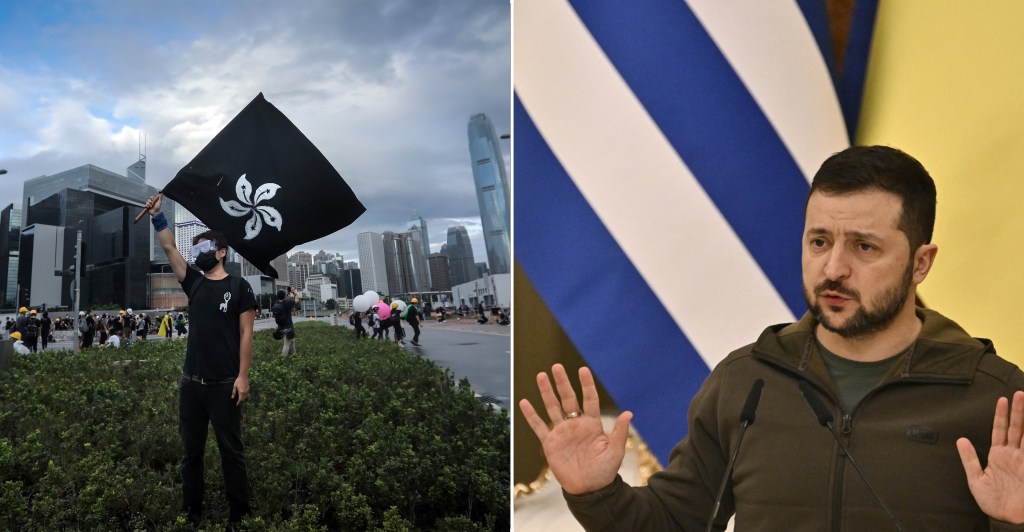Photos by Jeff Cheng
Whatever happens next, last night is going down in Hong Kong history. Following a full week of student strikes, an estimated 200,000 protestors poured into the city’s financial district surrounding government buildings as part of Occupy Central. Their demands, at their heart, are relatively simple: They want to be able to vote for whomever they want, rather than from a selection of candidates hand-picked by the national government in Hong Kong.
Videos by VICE
On Sunday morning, residents began gathering in droves at the news that police had blocked off roads to either side of the Legislative Council, preventing more people from returning to the student sit-in from the night before.
This peaceful standoff endured for some time. But around 6 PM, people began pressing toward the police-manned barricades chanting, “CY Leung [Hong Kong’s chief executive], grow some balls!” and raising their hands in the air to indicate their nonviolent intentions.
The cops acted quickly, aiming pepper spray at the eyes of those on the front line and lobbing teargas canisters into the crowd. Panic ensued, as a confused and blinded crowd tumbled over each other and legged it away from the clouds of stinging smoke.
Protesters use umbrellas to protect themselves from tear gas
Throughout the night teargas was used 87 times in different areas of the city, according to police, along with repeated baton charges in a relentless attempt to disperse the demonstrators.
“They gave us no warning,” sobbed Grace Chan, a 19-year-old who had turned up alone despite warnings from her parents. “This is how our government treats us. We’re unarmed; we just have umbrellas and goggles [to protect against pepper spray and tear gas]. How can they do this to us?”
Police inside clouds of tear gas
After the initial shock of such force being used in one of the safest and nonviolent cities in the world, kids showed undeniably bravery and determination, retreating calmly when teargas was fired but returning as soon as the toxic clouds cleared. Rumors that the army had been deployed and that rubber bullets were being fired led to tense moments of an almost eerie silence, with some students swearing passionately that they were ready to die.
The “umbrella revolution,” as it’s being dubbed on social media, soon spread to the key commercial and tourist districts of Causeway Bay and Mongkok. The crowds seemed to be winning, with police tactics proving ineffective at getting the protests to disperse for good.
Police hold a sign warning protesters of their intentions
By Monday morning the rows of heavily armed riot police retreated to loud cheers from the masses. Half the city had been brought to a solid standstill. Most banks and schools were closed, bus routes were blocked, and roads usually buzzing with merchants stood empty. Tens of thousands of protestors remained, many now using their umbrellas as a tool to shield them from the sweltering sun.
Relative calm ensued. Litter was picked up, people avoided sitting on the grass, and pathways were cleared for passing shoppers. Mounds of supplies arrived in the form of water bottles and individually wrapped biscuits; signs reading “We are very sorry for the inconvenience but we need democracy” were hung up over signposts, motivational speeches were made from every corner, and singing and chanting carried on into the night.
The authorities don’t seem to have an answer for the situation. CY Leung has publicly begged the demonstrators to go home and not to cause any more disruption. At a press conference earlier today, Hong Kong’s Chief Secretary Carrie Lam defended the police decision to use “necessary force” to disperse last night’s crowds.
Student leaders and Occupy Central organizers, meanwhile, have urged protestors to hold out until October 1, Chinese national day, when the next stage of civil disobedience will be announced.
“I will stay for as long as it takes,” said Jackson Tsung, a university student who has not showered or eaten warm food since Friday. “I am scared about what will happen to me, but what’s the point in living if we can’t live in a place we can call home?”



